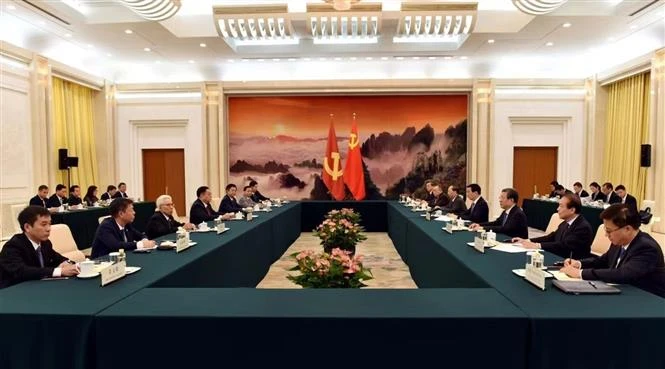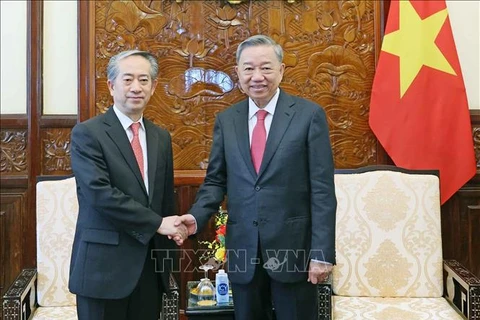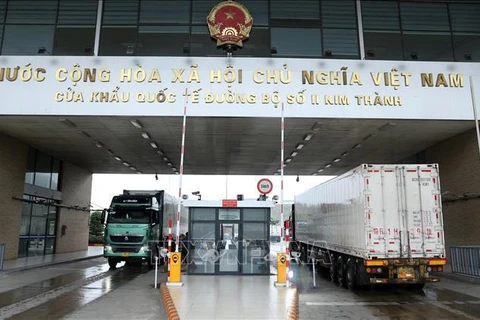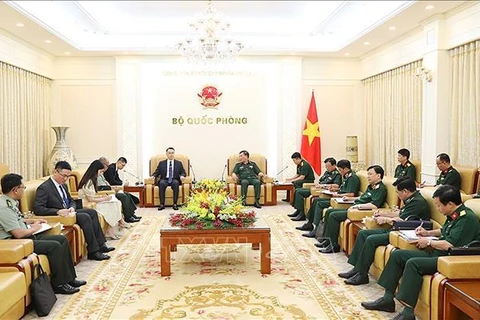
Beijing (VNA) – A delegation of the Communist Party of Vietnam (CPV) is paying a working visit to China from June 11-15 at the invitation of the Communist Party of China (CPC) Central Committee, aiming to help enhance political trust and realise high-level common perceptions.
Leading the delegation, Nguyen Trong Nghia, Politburo member, Secretary of the CPV Central Committee and Chairman of the CPV Central Committee’s Commission for Information and Education, had a meeting with Wang Huning, member of the Standing Committee of the CPC Central Committee’s Political Bureau and Chairman of the National Committee of the Chinese People’s National Political Consultative Conference, in Beijing on June 13.
Nghia stated that the Vietnamese Party and State always view developing relations with China as a strategic choice and a top priority in Vietnam’s foreign policy of independence, self-reliance, and multilateralisation and diversification of external relations.
To continue effectively implementing the important directions and common perceptions reached between the two Parties’ General Secretaries, he called on both sides to keep maintaining and increasing strategic discussions and all-level exchanges to help strengthen political trust.
The two sides should direct their sectors, all-level authorities, and localities to closely follow and seriously implement the common perceptions shared by the two countries’ Party and State leaders, the Vietnam - China joint statements, and the signed cooperation documents, Nghia said.
It is necessary to jointly maintain and promote a friendly, peaceful, and stable environment for relations between the two Parties and the two countries to develop soundly. In addition, the two sides need to cooperate in disseminating information and organising activities marking 25 years since the land border demarcation and 15 years since the signing of the three legal documents on land border between Vietnam and China, he continued.
With regard to the East Sea issue, Nghia asked the two countries to comply with the high-level common perceptions, put themselves in each other’s positions, respect each other’s legitimate and legal interests, strive to control and properly settle differences by peaceful means in line with international law and the 1982 UN Convention on the Law of the Sea (UNCLOS), and exert efforts to build the East Sea into a sea of peace, friendship, cooperation, and development.
For his part, Wang said the CPC is ready to foster cooperation and sharing of experience in the Party building and country management with the CPV, adding it believed that the 14th National Congress of the CPV will be successful.
He held that cooperation between the two Parties and the two countries have entered a new stage with a new level defined after the mutual visits by the two Parties’ General Secretaries. The development of Party-to-Party ties will give orientations and be a solid guarantee for the two countries’ cooperation in various fields to grow healthily and sustainably.
Agreeing with Nghia’s opinions about the direction for promoting the two Parties and two countries’ cooperation in the coming time, the host official suggested the two sides step up the sharing of experience in theory research and reality review, properly carry out the ideological work, and coordinate to build a defence line against sabotage plots, peace evolution, and colour revolutions.
Wang voiced his hope that Vietnam will continue supporting and engage more deeply in China’s initiatives.
He also pledged that China will create favourable conditions for its major, reputable, and capable businesses to enhance investment partnerships in Vietnam, and work closely with the latter to boost communications, people-to-people exchanges, and social consensus on the traditional friendship between the two Parties and the two countries.

Later on June 13, the CPV delegation held talks with Li Shulei, Politburo member, Secretary of the CPC Central Committee’s Secretariat and head of the CPC Central Committee’s Publicity Department.
The two sides informed each other about the situation of their respective Parties and countries, looked into the results of theory and reality review, and discussed the implementation of communication-related tasks defined in the 2023 Vietnam - China joint statement along with the cooperation documents between the CPV Central Committee’s Commission for Information and Education and the CPC Central Committee’s Publicity Department. They also worked out the orientations for promoting the two agencies’ ties in the time ahead.
The officials agreed that the two sides also need to work together to effectively manage and control information about complicated and sensitive issues as well as differences so as not to let hostile and reactionary forces to take advantage of to distort or drive a wedge into the relations between the two Parties and countries.
During the visit, the CPV delegation joined Chinese experts and scholars in a seminar to exchange experience in communications and information for foreign service. It also visited and worked with major press and media agencies of the Chinese Party and State./.






















